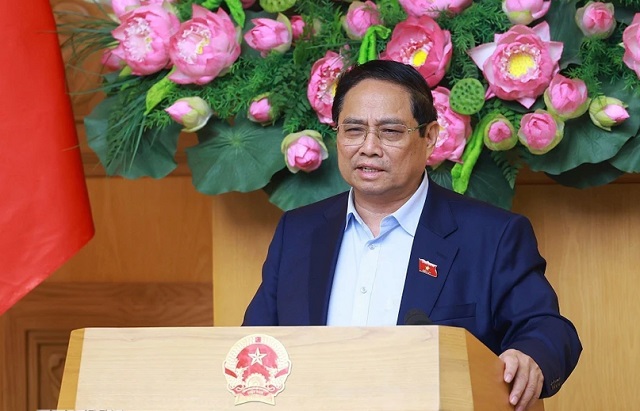
|
Prime Minister Pham Minh Chinh chairs a meeting to assess the impact of global conflicts on the domestic economic and social situation. (Photo: Duong Giang/VNA)
|
On the afternoon of June 23, Prime Minister Pham Minh Chinh chaired a meeting of the Government’s Standing Committee with ministries and sectors to evaluate the situation and propose solutions to cope with the developments in the Middle East and recent global events affecting Vietnam’s economic development.
Attending the meeting were Permanent Deputy Prime Minister Nguyen Hoa Binh; Deputy Prime Ministers Tran Hong Ha, Bui Thanh Son, Ho Duc Phoc, and Mai Van Chinh; ministers and heads of ministerial-level agencies; leaders of ministries, sectors, and central agencies; and major economic groups.
The delegates shared that the conflicts in the Middle East, specifically the mutual attacks between Israel and Iran, and the US attack on Iran, have directly impacted the global economy and various other aspects; including rising oil and energy prices, disruptions to global transportation and trade, and inflationary pressures.
In this context, Vietnam’s economy has also been affected, particularly in terms of transportation and import-export activities, despite relatively limited trade and investment relations with the Middle East, especially Israel and Iran.
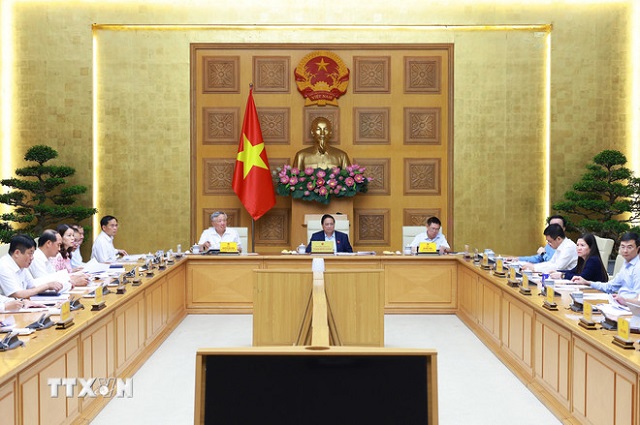
|
Prime Minister Pham Minh Chinh chairs a meeting to assess the impact of global conflicts on the domestic economic and social situation. (Photo: Duong Giang/VNA)
|
After discussions, Prime Minister Pham Minh Chinh concluded that the complex and unpredictable global situation could continue to impact the global economy and Vietnam, especially in terms of growth targets, supply chains, production chains, logistics, and consumption patterns.
The Prime Minister affirmed that despite the challenges, this is also an opportunity for Vietnam to restructure its economy towards a greener, faster, and more sustainable direction. He emphasized the need to diversify markets, products, and supply chains.
Reminding the ministries, agencies, people, and businesses to continue drawing on their experience in coping with situations since the beginning of the term, the Prime Minister urged them to remain calm, steadfast, and persistent in achieving the set goals. He emphasized the importance of closely monitoring the situation and proactively proposing timely and effective solutions within their functions and tasks. If something exceeds their authority, they should report it to the competent authority for direction.
Prime Minister Pham Minh Chinh directed the renewal and strengthening of traditional growth drivers such as investment, exports, and consumption, as well as breakthroughs in new growth drivers, including science, technology, innovation, digital transformation, and green transition.
Emphasizing the Party and State’s policy of building an independent, autonomous, and actively integrating international economy, the Prime Minister instructed the implementation of fiscal policies such as tax exemptions, reductions, and extensions, creating favorable conditions for people and businesses. He also directed continued efforts in increasing revenue, reducing expenditure, promoting savings, and accelerating public investment disbursement, especially for strategic infrastructure projects.
At the same time, there is a need to flexibly and firmly manage the monetary policy, carefully control the exchange rate, curb inflation, and pay attention to interest rates to ensure easier access to capital. It is crucial to avoid speculation in gold and foreign currencies and to expand credit in a controlled manner, prioritizing deep processing, agriculture, and exports, with a special focus on providing credit support to farmers.
“There must be close coordination between fiscal and monetary policies. Monetary policy should support fiscal policy and vice versa,” the Prime Minister emphasized.
The head of the Government requested ensuring the major balances of the economy, especially food and energy security. It is essential to control the market, particularly for food and foodstuffs, ensuring sufficient supply for both domestic consumption and export. Agriculture must be the pillar of the economy in all circumstances. Market stabilization is crucial, focusing on stabilizing fuel and electricity prices, as well as ensuring information security, especially in telecommunications.
The Prime Minister also instructed the continuation of FTA negotiations and the full exploitation of existing FTAs. He emphasized the importance of trade promotion, logistics improvement, customs reform, and support for businesses to reduce input and compliance costs. He reiterated the determination to persist in the tariff objectives in negotiations with the US.
Additionally, there is a need to develop the domestic market, especially domestic consumption, to help address market disruptions. Emphasis should be placed on promoting e-commerce, digital tax collection, and the movement “Vietnamese People Give Priority to Using Vietnamese Goods.” The development of tourism and the cultural and entertainment industries should also be prioritized.
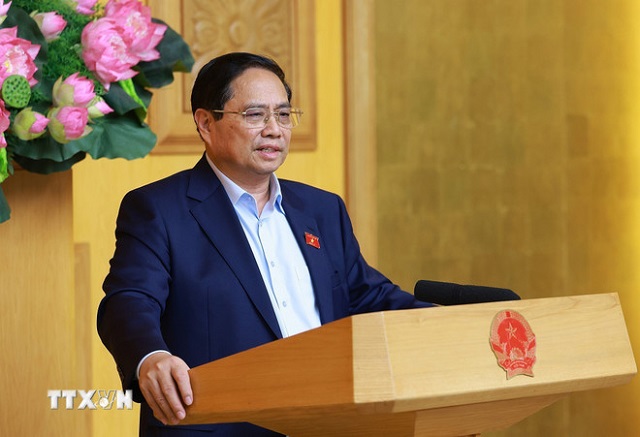
|
Prime Minister Pham Minh Chinh chairs a meeting to assess the impact of global conflicts on the domestic economic and social situation. (Photo: Duong Giang/VNA)
|
The Prime Minister directed the People’s Committees of provinces and centrally-run cities to promptly stabilize the two-level government. Ministries and sectors should actively delegate and decentralize power, ensuring no gaps in operations. He also instructed intensified efforts in combating counterfeit and unclaimed goods, with a focus on fake medicines and food, and strengthening inspection and examination to contribute to market stabilization, production expansion, and business development.
The Prime Minister urged businesses to effectively implement Resolution 68 of the Politburo, resolutions of the National Assembly and the Government, and actively contribute to the stimulation of consumption. He requested the review of budget reserves to boost consumption, the reduction of unnecessary administrative procedures, the enhancement of digital governance, the organization of supply-demand connections, and the attraction of investment and promotion of trade and tourism in a systematic manner.
The Prime Minister emphasized the need for close and harmonious coordination among ministries and sectors and called for strengthened propaganda on the country’s achievements to create consensus in society and confidence among investors, avoiding causing panic and speculation, and hoarding. He expressed his belief that with unity, determination, and proactive and effective responses, Vietnam would overcome all challenges and achieve the set goals.
Pham Tiep – June 23, 2025
A New Vision for Ho Chi Minh City: Prime Minister Pham Minh Chinh’s Call for Innovation and Progress
With a bold and ambitious vision, the Prime Minister has set a new course for Ho Chi Minh City. By 2030, the city aspires to join the ranks of the world’s top 100 most advanced, dynamic, and sustainable cities. This is a challenging yet inspiring goal, and with a focused and dedicated approach, it is an achievable one.
“All 63 Provinces and Cities Are Our Homeland”
“All 63 provinces are our homeland, and so are 34,” asserted Prime Minister Pham Minh Chinh. As we embark on the reorganization of local administration into two levels from July 1st, the Prime Minister has urged us to cast aside prejudices and act with urgency and determination for the greater good. There is no room for hesitation or the inertia of parochialism.
“UOB Retains 6% GDP Growth Forecast for 2025, VND to Recover from Q4”
UOB maintains its forecast for Vietnam’s economic growth at 6.0% in 2025 and 6.3% in 2026. The bank expects the economy to expand by 6.1% and 5.8% in the second and third quarters of 2025, respectively.

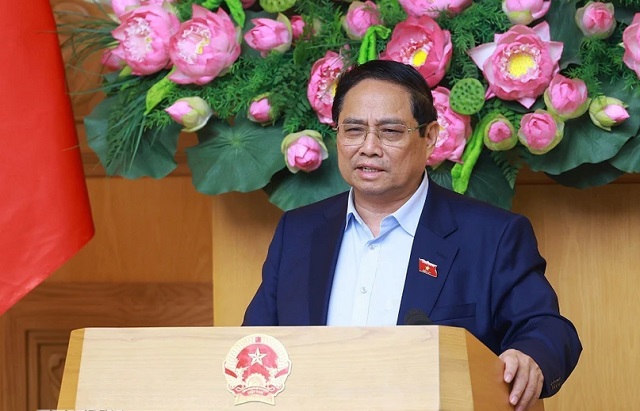
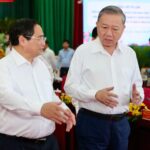
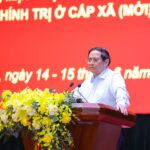

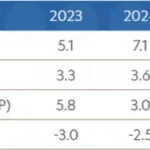
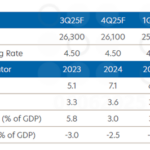



![[Photo Essay]: Experts, Managers, and Businesses Unite to Forge a Path Towards Sustainable Green Industry](https://xe.today/wp-content/uploads/2025/07/z678592918-150x150.jpg)


![[Photo Essay]: Experts, Managers, and Businesses Unite to Forge a Path Towards Sustainable Green Industry](https://xe.today/wp-content/uploads/2025/07/z678592918-100x70.jpg)







